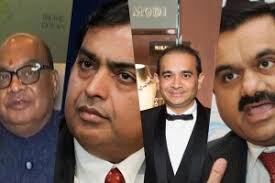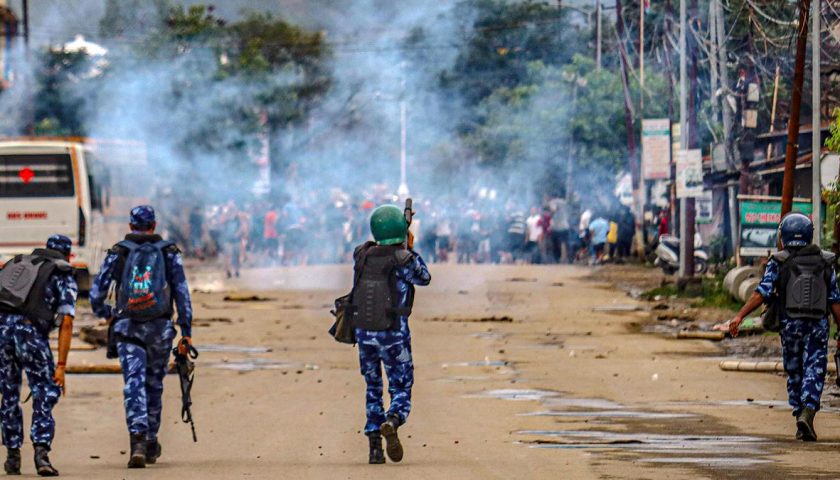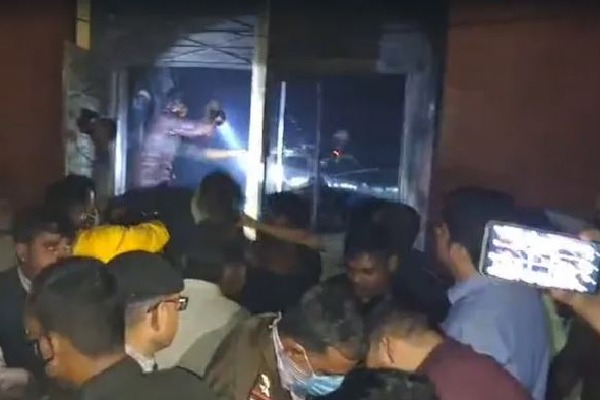‘Marriage arrangements help ensure that control over capital doesn’t go out of the community.’
 A recent spate of loan defaults – most of which curiously centre around trade finance and buyer’s credit – has shined a spotlight on the close and influential links between some of India’s wealthiest business families.
A recent spate of loan defaults – most of which curiously centre around trade finance and buyer’s credit – has shined a spotlight on the close and influential links between some of India’s wealthiest business families.
The world over, it is natural for the sons and daughters of business elite to marry into other family-run corporate empires, even if such alliances are a more pronounced feature of the Indian power elite than of their counterparts in North America or Europe.
Sometimes, business interests coincidentally overlap – like when Videocon chief Venugopal Dhoot’s nephew (Saurabh) married Bhushan Power and Steel chairman Sanjay Singhal’s daughter (Radhika) in 2010 or when the sister of Reliance’s Mukesh Ambani (Dipti) married into the Salgaocar family of Goa in the 1980s.
Most times, CEOs and industrialists insist, these marriages merely happen because, they come from similar backgrounds and cultural communities. A classic example of this is TAFE’s Mallika Srinivasan marrying the TVS Group’s Venu Srinivasan.
Modi and Ambani
In the last week, India’s public sector banking system has been rocked by a series of defaults – prompting allegations of crony capitalism and corruption – by import-driven and family-led businesses. The main perpetrator at the centre of the storm is Nirav Modi’s jewellery empire.
Last week, news broke that Modi, his brother Neeshal and his uncle (Mehul Choksi) and a number of diamond import firms they are associated with allegedly orchestrated a massive Rs 11,000 crore financial fraud.
As it turns out, these companies have links through marriages to the Ambani and Adani families.
Neeshal Modi, who has also been charged by the CBI in the case, is linked to the Ambanis through his marriage to Mukesh Ambani’s niece, Isheta Salgaocar. As pointed out above, Mukesh Ambani’s sister (now Dipti Salgaocar) married into the family that runs the V.M. Salgaocar mining conglomerate. Dipti’s daughter, Isheta. got engaged to Neeshal Modi in 2016. As The Economic Times reported at the time, a pre-wedding celebration bash was hosted by Mukesh Ambani at his Antilla residence in Mumbai.
Nirav Modi’s Ambani connection goes beyond the personal and extends to the professional – on Monday, the CBI reported that it had also questioned Vipul Ambani, the chief financial officer of one of Nirav Modi’s companies. Vipul Ambani is reportedly the nephew of Dhirubhai Ambani (the son of Natubhai Ambani) and a first-cousin of Mukesh and Anil Ambani.
According to Bloomberg’s corporate database, Vipul started his career at Reliance Industries, in their project and industrial engineering group. After a long stint at brokerage firm Tower Capita, he reportedly shifted to Nirav Modi’s Firestar International.
Kothari, Adani and Mehta
Over the last two days, Rotomac Pens has also been in the spotlight. On Monday, the Central Bureau of Investigation registered a case against Rotomac promoter Vikram Kothari and his family (wife Sadhana and son Rahul) in connection with a case related to the alleged swindling of Rs 3,696 crore of bank loan funds.
What is lesser known is that Vikram Kothari’s daughter, Namrata, is married to Pranav Adani, a nephew of the industrialist Gautam Adani. Pranav joined the Adani empire after completing his business management degree from Boston University, going on to become the managing director of Adani Wilmer, the group’s agri-business arm. ‘Namrata Adani’ is named in Adani corporate documents and associated with Pranav Adani in a handful of media reports.
The Adani family, incidentally, is also related to the only other diamond merchant defaulter that is comparable to Nirav Modi – Jatin Mehta of Winsome Diamond fame.
As The Wire has reported, Mehta is related by marriage to the Adani family. In 2012, Mehta’s son Suraj married Krupa, the daughter of Gautam Adani’s brother, Vinod Shantilal Adani.
Incidentally, Vinod Adani’s name in recent times has appeared in the over-invoicing of imports case that the Directorate of Revenue Intelligence (DRI) has slapped on the Adani Group. In its notice, the DRI alleged that the Mauritius entity through which the extra money was routed was allegedly controlled by “Vinod Shantilal Shah, alias Vinod Shantilal Adani”.
‘Keep it in the family’
“Of course it’s divided as to whether it is a negative thing or a positive thing. Marriages, social relations and kinship relations play a big role in Asian capitalism. It also plays a big role in complying with regulations. So for instance in India when the requirement came in that India Inc’s board should include at least one woman director, we saw Indian businesses bring in female family members to comply with that,” said Rajesh Bhattacharya, associate professor at IIM- Calcutta, who teaches a course on Indian business history.
“Historically in India, kinship and community relations allowed businesses to have access to credits and markets. You keep it within the business community. So particularly, marriage arrangements help ensure that control over capital doesn’t go out of the community,” he added.






